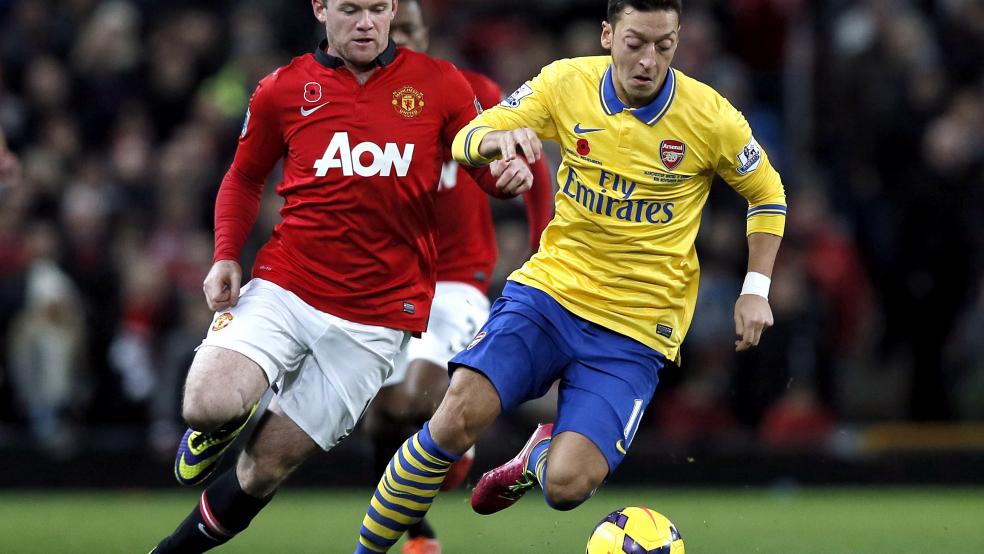At the close of the Barclay’s Premiere League Season last May, NBC sent promoters into the various soccer bars around the nation to hand out themed merchandise. All of the merchandise (yellow and red cards, jerseys, scarves, pint glasses) had one message: Next season NBC would be taking over coverage and it would be showing every game live. The network knew it was taking a gamble that had bitten others in the past, but it was doing everything it could to make sure this time would be different.
For the previous decade, BPL coverage in the U.S. had been primarily handled by Fox Soccer Channel, and to be fair to Fox, it did a tremendous amount of good work (along with ESPN) in promoting the league. By the final few seasons a number of the marque games were even shown on Fox proper, and to largely positive results. The largest drawback of Fox’s coverage was that many games had to be shown tape-delayed, meaning fans would have to avoid modern social networks if they didn’t want to see the final score of a game that finished four hours earlier.
Related: Top Ten Big Money Soccer Transfers
But NBC, with its stable of overflow channels and impressive streaming options, was able to promise that every game could be viewed live, as it happened, and in HD. Throw in a relatively well-produced studio package before, during and after the games – a production that’s equal parts English and American – and it’s hard to argue that NBC hasn’t upped the game. Now, as the first batch of ratings start to pour in, it’s equally hard to argue that NBC’s soccer play hasn’t worked out well.
Within the first five weeks, NBC racked up over 9 million viewers, averaging 391,000 viewers per game. Those aren’t anywhere near NFL numbers, but they’re not bad at all, especially considering when the games air. Because of the time difference between the U.S. and U.K., all of those viewers came during weekend mornings and early afternoon timeslots (depending on the time zone), when other channels mostly show children’s programming and news. NBC’s early numbers represent a 70 percent increase over FSC’s ratings over the same period last year. TV programming execs have discovered what Irish bars have known for years: There is an audience for sports in the morning.
It’s not just expats, alcoholics and hipsters watching (admittedly, a Venn diagram with a decent amount of overlap). Most impressively, kids aged 6 to 17 make up 11 percent of the audience. In comparison, the same age group made up only 4.6 percent of the World Series audience, a fact that has to have MLB sweating about its future fandom. Several generations of middle class American kids have now grown up with soccer as a game they played but didn’t often watch. Now NBC has given them an easier way to follow soccer when they’re not on the pitch and watch what many consider to the best league in the world.
Related: David Beckham: 20 Years of Soccer and Sex Appeal
By happy coincidence, NBC viewers are also tuning into what will be the most exciting BPL season in recent memory. In the last decade, only three teams have won the league: Manchester United (6 times), Chelsea (3) and Manchester City (1). But those teams are all struggling. Powerhouse Manchester United just appointed its first new coach since 1986 and the new boss, David Moyes, is doing his best to prove that his predecessor, the famed Sir Alex Ferguson, was actually a talented manager and not just the lucky coach of an expensive team. Chelsea and Manchester City are finding life under new managers equally bumpy. With a third of the season gone, the teams find themselves in 4th, 5th and 8th, respectively.
That means that NBC will likely have a full slate of competitive, meaningful games with teams like Arsenal, resurgent disco-era powerhouse Liverpool and newly promoted Southampton all challenging for the top spot in a wide open league.
Related: The NFL’s Fantastic Finances
Even Fox and ESPN can claim this as a victory as it still retain rights to the Champions League and ESPN will air next summer’s World Cup. The increase in viewers to soccer in general will surely mean bigger audiences for these major events.
Perhaps the biggest loser in the whole equation is Major League Soccer. Despite years of valiant effort to build a successful soccer league in the U.S., the MLS remains a TV wasteland. Though attendance at the games is way up, largely supported by soccer parents in urban centers, the league’s TV ratings are still worse than the WNBA’s. Even American soccer fans with a vested interest in the success of the league find it hard to watch the comparative chopped liver of the MLS once they get used to the filet mignon of the BPL.
Still, after years of empty promises and unfulfilled potential, soccer’s influence in the states is clearly – finally – growing, and NBC stands to be the biggest winner on the pitch.
Top Reads from The Fiscal Times

